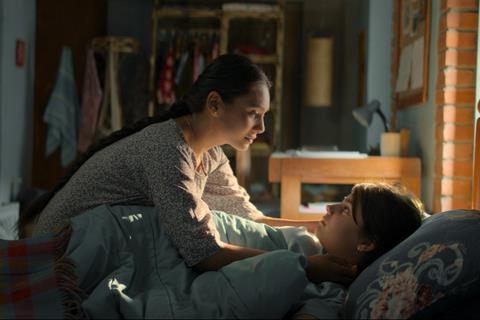
The mundane domestic and deeper social burdens that South Asian societies place on women are framed in a wider political context in Nepali-US drama film Shakti, which plays this week in the Cinema of the World section at the International Film Festival of India (IFFI).
Shakti centres on Durga, a single mother who works tirelessly to support her family while raising her spirited nine-year-old daughter, Lila. But when Lila begins to change in unsettling ways, Durga’s fragile world starts to unravel. Struggling against stigma, corruption and the weight of her own past, she fights to protect her daughter in a society that refuses to recognize their worth.
The film is the feature directing debut of Nani Sahra Walker, who was educated in Japan and the US. She previously served as executive producer at LA Times Studios on The Last Repair Shop, 2024 winner of the Academy Award for best short documentary.
“Stepping into directing narrative films felt like a natural evolution of my work,” Walker told Screen. “My approach to producing has been creative and holistic. Directing allowed me to bring my full creative voice forward.”
The film had its world premiere at the Heartland International Film Festival, where it won the best narrative premiere award and the Richard D. Propes Narrative Social Impact Award.
It was subsequently named best foreign feature film at the Female Eye Film Festival in Toronto and best social justice film at the Tasveer Film Festival in Seattle. It is also a nominee for the Netpac Award at Hawaii International Film Festival.
After Goa, Shakti will next screen at the Nepal Human Rights Film Festival, returning to Kathmandu where the story is set and where Walker was born and raised.

“The political angle is important to me and for Nepal,” said Walker. The film confronts the restrictive statute of limitations that survivors face in Nepal, grounding the film in the country’s larger fight for justice, accountability and inclusivity.
“When I learned about the restrictive statute of limitations in Nepal, it felt like a direct calling. I was stunned by the barriers survivors face. The urgency of revisiting those laws is at the core of the film.”
While the film is clearly topical – Nepal this year has been racked by Gen-Z-led anti-establishment and anti-corruption protests and is headed for elections in 2026 following the toppling of the president in September – it has been years in the making. At project stage, the film attended the Cine Qua Non Lab. It was supported by the ARRI International Support Program and by the Gerbode Foundation during the development phase through its Advancing Truth initiative.
Distribution of the film is handled by Buffalo 8, which took rights for the US, Canada and the UK.
IFFI organisers say that they are placing increasing focus on women filmmakers and that this year’s feature selection includes more than 50 female-helmed titles.
Walker is developing two further narrative features — one set in the US and another set in India.

























No comments yet